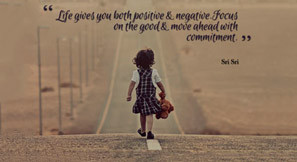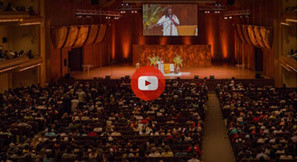Atlanta, Georgia
(On April 3rd, 2013, His Holiness Sri Sri Ravi Shankar was honored with the Gandhi-King-Ikeda Community Builders Prize, the highest honor given by the Martin Luther King Jr. International Chapel, Morehouse College in Atlanta, in recognition of his work as global ambassador of peace, international humanitarian, social activist and spiritual leader.
The Reverend, Dr. Lawrence Carter, Dean of the Chapel, observed ‘Not since Mahatma Gandhi has one person united people of different traditions and faiths into a spiritual communion across the length and breadth of India.’ Below is the transcript of What Sri Sri Said at the event:)

I feel like a kid who is receiving a lot of awards and gifts today.
Today is a day of gifts.
It is often said, ‘Life itself is a gift from God, to all of us.’ Let us honor this gift.
Today I thank the Morehouse College, the Dean, the President and all the dignitaries here who have found me worthy of getting this award and bestowing this award to me.
I rededicate this award to all those who work ceaselessly in their silent manner, in their little corners, in their community for peace and non-violence.
This recognition of peace and non-violence as a driving force for social change, social justice is noteworthy.
There are medals for war, people who fight in wars do get medals. But getting a medal for peace and non-violence, in itself, changes the paradigm of society.
Unfortunately, in the last several decades, aggression has got itself attached to pride. It is time now, that we reverse this tendency. Pride should be in non-violence and in peace.
When we were growing up as children, we grew up with stories of Mahatma Gandhi. I want to tell you about my teacher who is still alive, and who has completed 118 years of his life today. This gentleman taught Mahatma Gandhi the scripture, Bhagavad Gita, when he came back from South Africa. And he was with him for 40 years as his tutor, and also as his writer.
He used to be the translator and script writer for the southern languages. His name is Pandit Sudhakar Chaturvedi.
So he used to tell us the stories or the incidents he had with Mahatma Gandhi. Some of them are not recorded, so you don’t find them in any books. I would like to narrate a few such stories which might inspire you.
One incident was when Mahatma Gandhi was travelling in a small train uphill to Darjeeling. Darjeeling is a hill station in India, and you have a small train that goes there. It is a narrow gauge train. Now what happened is that, when the train was moving up the hill, somewhere, the engine got itself disconnected from the coaches. So the engine went ahead and the coaches started sliding backward.
Just imagine on a big hilly terrain, coaches are sliding backward, what would happen? There was huge panic, as people were between life and death. Any moment the coaches could fall off the hill, and one would not even find a trace of a bone. It was the Himalayas.
So while there was panic all around, Mahatma Gandhi was dictating letters, and he said to my teacher; he used to call him Bangalori, because he was from Bangalore; ‘Bangalori, take dictation.’
My teacher said, ‘Bapu (father, referring to Mahatma Gandhi), do you know what is happening? We may not be alive. We are in-between life and death. The coaches are moving backward with nothing to stop it, and its gaining speed.’
Do you know what Mahatma Gandhi said then? He said, ‘Suppose we get saved, we would have wasted all this time. If we die, we die. But if we are saved, we wasted so much time? So, come on, take dictation.’
With trembling hands my teacher was taking dictation.
He used to tell me, ‘Look at this old man, he would not waste a moment of his life.’
There is another story I would like to share with you.
Once Gandhi’s dhoti, i.e., his garment was torn, and someone said, ‘Bapu, your dhoti is torn.’ So Gandhi goes into the bathroom and adjusts his garments a little bit, and then says, ‘See now, and tell me where it is torn? There is a lot of it left to get torn.’
So his idea was not to waste resources; not to be a consumerist by nature.
There is enough for everybody’s need, but not for everybody’s greed - this was the message he used to give.
Gandhi had such a soft heart like that of a child; innocence of a child.
What is needed today is the innocence of Gandhi, and the valor, vigor, commitment and vision of Martin Luther King Jr. These two things combined together, is the answer for the situation we are in today.
I won’t say that Gandhi’s principles alone will work in today’s scenario. If you are fasting, people will say, ‘You keep fasting, never mind. You can do that much good for the world.’ You need along with that, the heart and the commitment that Martin Luther King had shown to the world. Then it makes it complete, and then social justice, and the much needed revolution in today’s world would come forth. And it has to come forth from the youth of today. All of you who are sitting here, you have to stand up for non-violence.
In the United States of America, last year alone, there has been ten million recorded incidents of violence. Violence against children, violence against women, violence against races, violence against religious groups, etc. Intolerance is growing in society. But we don’t need to panic, because truth and non-violence will always win.
What we need to do is to create a billion acts of non-violence. For every act of violence, we have to create hundred acts of non-violence. The voice of non-violence has to be heard loud and clear. This is what we need.
We all sang today, ‘We will be the change that we want to see in the world.’ So the change starts from right here, where we are; from each one of us.
Another incident of Mahatma Gandhi that my teacher used to share.
My teacher was in Yerwada jail, along with Mahatma Gandhi. There were only three of them, Mahatma Gandhi, Mahatma Gandhi’s wife Kasturba Gandhi, and my teacher.
This incident is of the last day of Kasturba Gandhi. She was on her death bed, and Mahatma Gandhi comes out of the room, and he says, ‘Bangalori, today is the day of my trial. Today is the day to see how I can maintain my equanimity. How I can see everybody in the same way. Today is the day of my test.’
As he was saying these words, drops of tears were flowing down his eyes.
My teacher said, ‘I have never seen him in that state ever before. But those drops of tears said it all.’
Mahatma Gandhi said, ‘Today, I have to say good-bye to my companion of 40 years. She was my strength, she was my inspiration, and she was the one who took all my garbage, all my weaknesses and who swallowed it and stood by my side. Now, today, I have to keep myself in equanimity. Today is the test of my spirituality.’
So, these moments in life, where you personally observe, watch, understand yourself, and see what is happening within you, makes a big difference in your life.
Who are you? What do you want, and what do you want to convey? Observing this, makes a difference.
Do you know, neither at school, nor at home, does anyone learn how to get rid of negative emotions, or how do be centered, or how to feel belongingness with everyone. This is exactly what we need today. We need to reach out to communities.
Communities can no longer remain as isolated groups. Each community should come and shake hand with the other communities.
I am so happy that the Ikeda Foundation is also involved here and they are doing such good work in so many countries, bringing different communities together.
The teachings of Buddha, the teachings of Jesus and the teachings of Krishna, they all point towards one thing, that we are all made up of love, and we are love. Let us live this. Let us find an expression to this. Let us recognize this spirit in each one of us.
The message of Jesus is, ‘You are love and God is love.’ The interfaith community has a bigger role to play today, of uniting the fragmented communities, and reaching out to all those people who are engaging in violence. This is inclusive of domestic violence and societal violence. Also, being violent towards oneself, is a thing to be considered.
Many people eventually commit suicide because they are too hard on themselves. Thousands of people are committing suicide in the world today. Depression is taking such a big toll. In these circumstances, we all have to raise our voice and work towards non-violence.
A while back, I was in South America, in Mexico, at the traffic light signal, there was an argument between two taxi drivers. They both got out of the car and shot each other. There were passengers sitting in the taxis and they didn’t know what to do. The drivers were gone. Intolerance and stress have to be attended to.
Let us all join together and in this year create one billion acts of non-violence, acts of friendship, and acts of compassion. Our children should get a better world than what we have inherited.










